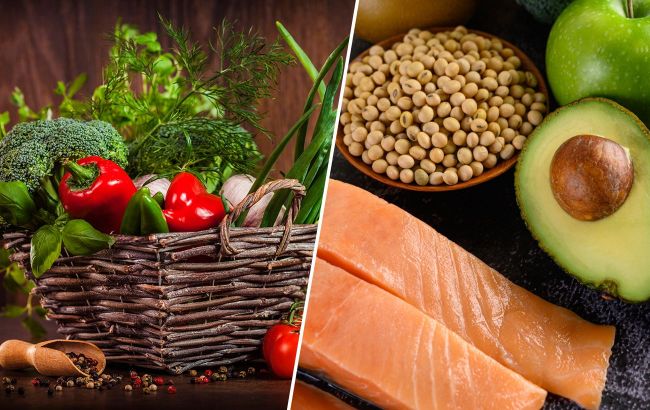Delicious ways to improve your heart health: Foods to add to your diet
 Doctors named the best foods for heart health (RBC-Ukraine collage)
Doctors named the best foods for heart health (RBC-Ukraine collage)
Taking care of heart health is very important, as it is susceptible to the negative impact of many factors, from food to stress. Proper nutrition will help you maintain a healthy heart and resist problems.
Here are some products that will help strengthen heart health, according to WebMD.
Fresh herbs
You make a heart-healthy choice when you add them to food instead of salt and fat. They add flavor without harmful additives. Spices and other products are tasty ways to eat wisely.
Red wine
If you drink alcohol, a little red wine can benefit the heart. Resveratrol and catechins, two antioxidants in red wine, can protect artery walls. Alcohol can also increase HDL and good cholesterol levels.
Tip: excessive alcohol is harmful to the heart. Do not drink more than one serving a day for women and two servings for men. It's best to consult with a doctor first. Alcohol can cause problems for people taking aspirin and other medications.
Salmon
The best product for heart health, rich in omega-3. Omega-3 is a beneficial fat that can reduce the risk of heart rhythm disturbances and high blood pressure. They can also lower triglyceride levels and tame inflammation. The American Heart Association recommends two servings of salmon or other fatty fish per week.
Cooking tip: bake salmon in foil with herbs and vegetables. Add cooked salmon to fish tacos and salads.
Tuna
Tuna, often cheaper than salmon, also contains omega-3. Albacore (white tuna) contains more omega-3 than other tuna varieties. Try grilling tuna steaks with dill and lemon. Try other sources of omega-3: mackerel, herring, lake trout, sardines, and anchovies.
Health tip: choose tuna packed in water, not oil, to keep it heart-healthy.
Olive oil
This oil is a beneficial fat made from crushed olives. It is rich in heart-healthy antioxidants that can protect your blood vessels. When olive oil replaces saturated fats (such as butter), it helps lower cholesterol levels. Try it with salads and cooked vegetables or on bread.
Taste tip: for better taste, choose cold-pressed olive oil and use it within 6 months.
Walnuts
A small handful of walnuts per day can lower cholesterol levels. It can protect against inflammation in the heart arteries. Walnuts are rich in omega-3, beneficial fats called monounsaturated fats, plant sterols, and fiber. The benefit is seen when walnuts replace harmful fats, such as those in chips and cookies.
Tip: try walnut oil in salad dressings.
Almonds
Sliced almonds go well with vegetables, fish, chicken, and desserts. They contain plant sterols, fiber, and heart-healthy fats. Almonds can help lower LDL cholesterol levels. Take a small handful per day.
Taste tip: toast them to enhance their creamy, soft flavor.
Tofu
Eat tofu, and you'll get excellent soy vegetarian protein with heart-healthy minerals, fiber, and polyunsaturated fats. It can take on the flavor of spices or sauces used in its preparation.
Tip: cut firm tofu, marinate it, then grill or sauté it without using oil. Add tofu to soups for protein with little fat.
Sweet potatoes
Replace white potatoes with sweet potatoes. Due to their lower glycemic index compared to white potatoes, these potatoes do not cause a rapid spike in blood sugar levels. They also contain fiber, vitamin A, and lycopene.
Taste tip: enhance their natural sweetness by adding a bit of cinnamon and lime juice instead of sweet fillings.
Oranges
Sweet and juicy oranges contain pectin, which fights cholesterol. They also have potassium, which helps control blood pressure. In one study, 2 cups of orange juice daily reduced diastolic blood pressure in overweight patients.
Nutrition tip: an average orange contains about 62 calories and 3 grams of fiber.
Barley
Try this nutty whole-grain dish instead of rice. You can also cook barley in soups and stews. Barley fiber can help lower cholesterol levels. It can also reduce blood sugar levels.
Tip: Pearled or whole-grain barley is the most nutritious. Barley groats are toasted and ground to make excellent flakes or a side dish. Pearl barley cooks quickly, but it has less heart-healthy fiber removed from it.
Oatmeal
A warm bowl of oatmeal satisfies you for several hours, fights snack attacks, and helps maintain a stable blood sugar level over time, making it beneficial for people with diabetes. Oat bran fiber can help your heart by lowering LDL cholesterol levels. The best results come from using oat flakes, steel-cut or slow-cooked.
Baking tip: Making pancakes, muffins, or other baked goods? Replace one-third of the flour with oat flakes.
Flaxseeds
This shiny honey-colored seed has three things that are beneficial for your heart: fiber, phytochemical compounds called lignans, and omega-3 fatty acids.
Tip: For better nutrition, grind flaxseeds. Add them to flakes, baking, yogurt, or mustard on sandwiches.
Fat-Free Yogurt
When you think of dairy products, you probably think, "Good for my bones!" These products can also help control high blood pressure. Yogurt is rich in calcium and potassium. To truly increase calcium content and minimize fat content, choose low-fat varieties.
Cherries
Cherries, sour cherries, dried cherries, and cherry juice - they are all great. They all contain antioxidants called anthocyanins, believed to help protect blood vessels.
Blueberries
Blueberries are just great nutritionally. They are anthocyanins, antioxidants that help blood vessels. These antioxidants give berries a dark blue color. Blueberries also contain fiber and many other beneficial nutrients. Add fresh or dried blueberries to flakes, pancakes, or yogurt.
Dessert idea: Turn a portion into a puree for a sweet sauce that can be used as a topping or poured over other sweet treats.
Dark leafy greens
Your parents were right when they advised you to eat greens. They are full of vitamins and minerals. They also have a lot of nitrates - substances that help open blood vessels so that oxygen-enriched blood can reach the heart. You will find them in vegetables such as:
- Lettuce
- Spinach
- Mustard greens
- Arugula
Serving tip: Enhance the flavor by adding greens to stir-fry, sauté them in olive oil, or cook them with garlic.
By the way, we previously wrote about products you should not eat with stomach problems.
We also talked about five products that slow down metabolism.
This material is for informational purposes only and should not be used for medical diagnosis or self-treatment. Our goal is to provide readers with accurate information about symptoms, causes, and methods of detecting diseases. RBС-Ukraine is not responsible for any diagnoses that readers may make based on materials from the resource. We do not recommend self-treatment and advise consulting a doctor in case of any health concerns.

